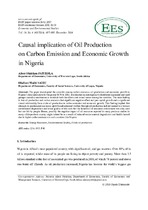| dc.contributor.author | Jaiyeola, Afeez Olalekan | |
| dc.contributor.author | Saibu, Olufemi Muibi | |
| dc.date.accessioned | 2021-03-11T13:04:27Z | |
| dc.date.available | 2021-03-11T13:04:27Z | |
| dc.date.issued | 2016 | |
| dc.identifier.citation | Jaiyeola, A. O., & Saibu, O. M. (2016). Causal implication of oil production on carbon emission and economic growth in Nigeria. Economic and Environmental Studies,16(4), 687-698 | en_US |
| dc.identifier.issn | 2081-8319 | |
| dc.identifier.uri | http://hdl.handle.net/10566/5983 | |
| dc.description.abstract | The paper investigated the causality among carbon emission, oil production and economic growth in
Nigeria’s time series data for the period 1970 to 2013. It estimated an autoregressive distributed lag model and used
granger causality mechanism to establish both the effects and causal nexus among the variables. The main finding
is that oil production and carbon emission had significant negative effect real per capital growth and a significant
causal relationship from crude oil production to carbon emission and economic growth. This finding implied that
attempts to quicken real economic growth and enhanced welfare through oil production had led instead to a worsen
environment degradation and lower quality of life such that the benefit of oil resources endowment was only seen
but not felt by people. Hence, possibly the negative impact of oil resources reported in many previous studies in
many oil dependent country might indeed be as a result of induced environmental degradation and health hazard
due to higher carbon emission in such countries like Nigeria. | en_US |
| dc.language.iso | en | en_US |
| dc.publisher | Opole University | en_US |
| dc.subject | Energy resources | en_US |
| dc.subject | Environmental quality | en_US |
| dc.subject | Crude oil production | en_US |
| dc.subject | Nigeria | en_US |
| dc.subject | Economic growth | en_US |
| dc.title | Causal implication of oil production on carbon emission and economic growth in Nigeria | en_US |
| dc.type | Article | en_US |

